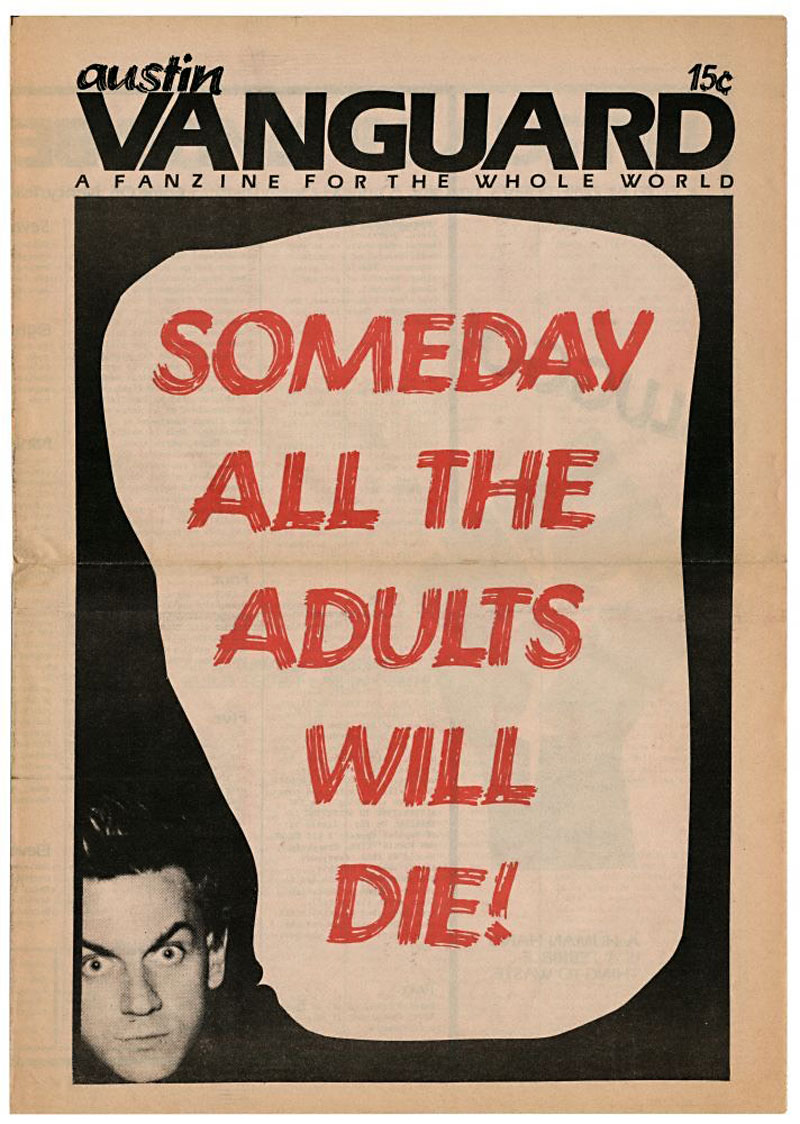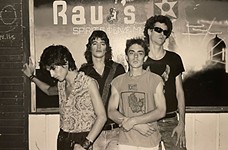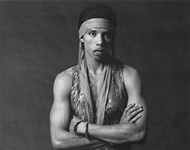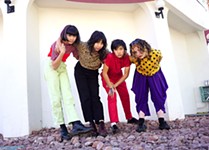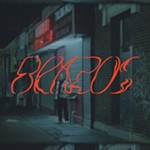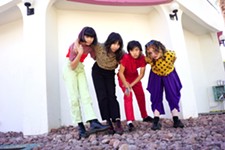Raul's in Overdrive: "AUSTIN IS UN-MELLOWING OUT!"
Patti Smith and Elvis Costello visit Raul's, after the Bodysnatchers beat the Skunks to vinyl, in Chapter 6, Part 2 of the "Austin Punk Chronicles"
By Tim Stegall, Fri., Dec. 30, 2022
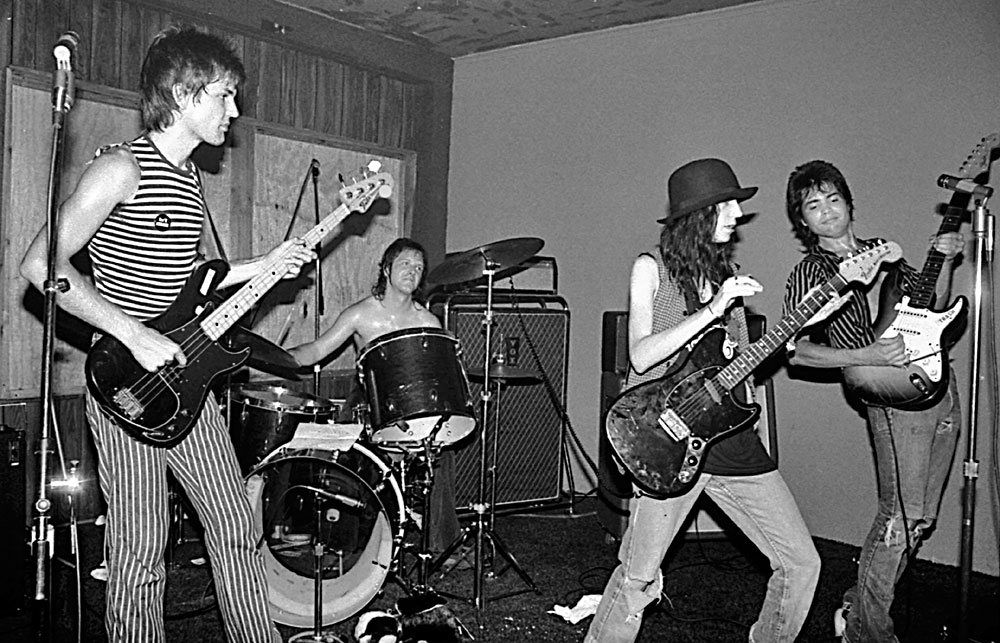
Editor’s note: This is Chapter 6, Part 2 of a serialized history of Austin punk by veteran writer and punk musician Tim Stegall. You can read past installments of the “Austin Punk Chronicles” here.
Boycott Bogus Skunks LP
"We were young, fast, and loud," drummer Billy Blackmon asserts these days regarding the Skunks, whose engine room he stoked for three years. "It doesn't sound like much now, but at the time it was very, very different and disturbing. Everybody hated us. We had to fight for every fucking gig that we got in the beginning. It was rough."
Though the Skunks were booked at Esther's Follies by owner Shannon Sedwick, Blackmon says that they could not get shows at Austin's glam palace in decline, Mother Earth, "nor at any of the 20 other places." Guitarist "Fazz" Eddie Muñoz verifies that the Skunks eventually played Mother Earth's second Riverside location, later the Back Room and now Emo's, in April or May of 1978. The headliner: San Antonian Chris Geppert, a year away from becoming Grammy-winning, chart-topping, yacht rock icon Christopher Cross.
"No one wanted punk," insists Blackmon. "But when we got on the radio and in the newspaper and people figured out they could make money off us, they let us in. But nobody did us any favors, because we were real outsiders. People hated punk music, especially the Cosmic Cowboys. We took a lotta shit from them. I've got no respect for that scene at all."
Let's back up – "when we got on the radio"? Yes, the Skunks demos KOKE-FM deejay Joe Gracey recorded in his Electric Graceyland basement studio got significant airplay and major request line action on local radio. The band also received major 1978 local press features, including Joe Nick Patoski's 1,000-word piece for the Austin American-Statesman's Aug. 25 edition, or Michael Ventura's huge five-page Raul's spread featuring plenty of Skunks verbiage in the Austin Sun's June 30 issue. No wonder Gracey and fellow progressive country hero Bobby Earl Smith saw commercial potential in the Skunks – they were now the acceptable face of Austin punk.
So why didn't the album drop in January 1979, as Gracey and Smith's Rude Records announced? Singer/bassist Jesse Sublett blamed decibels in the Chronicle's Skunks retrospective in 2000.
"We played really, really, really loud," Sublett told Chronicle writer Ken Lieck. "Back then they didn't know how to record a band like that – you put a mike in front of a loud amp and it just comes out sounding tinny. It sounded awful, basically. … We did everything on the cheap, and it's unfortunate."
What's now dubbed The Black Album finally saw what Sublett described as a "clandestine, car-trunk sort of distribution" in 1981. Indeed, tracks escaping those basement sessions, such as "Television Lover" and a chain-drive deconstruction of Chuck Berry's "Memphis," resembled a loud band playing under 52 blankets.
Sublett and roadie Richard Luckett delivered letters to record stores disputing Gracey and Smith's rights to the release, reading "Boycott Bogus Skunks LP." The claim was technically untrue, considering Smith's cocktail napkin contract. Rude Records responded with a press release headed "Beware Rabid Skunks," but the band's anti-hype took hold and record retailers refused to stock it. Only a small quantity made it to the public. After three years of delays, the instant collector's item was hardly Austin's First Punk Album.
Today, Sublett says he eventually reconciled with Gracey and Smith.
For his part, Blackmon states flatly: "We got ripped off. Joe Gracey was great, and he did a lot for us, a real gent. But … they took advantage of us. They didn't even put our names on the record! It was really shitty and underhanded. I'm still bitter over that."
The Austin Punk Scene's First Record
Meanwhile, the Skunks' Monday night billmates the Bodysnatchers zoomed past them in the race to become the first Raul's band on vinyl.
On July 14, 1978, guitarists Tom McMahon and Chris Bailey, the latter's drummer brother Ian, singer Larry James, bassist Jimmy Pettit, and "tenor" bassist Kyle Brock entered Pecan Street Studios – the very same facility where Doug Sahm and Smith helmed Roky Erickson's chaotic "Two Headed Dog" session in 1975 (as detailed in Chapter 1, Part 2).
"Ian had some baffles set up around his drums so they wouldn't bleed into the guitar microphones," recalls McMahon. "They put Larry in an isolation booth, and we all had headphones on. [Producer/engineer] Jay Podolnick mixed it live on their 24-track Neve board, down to two tracks."
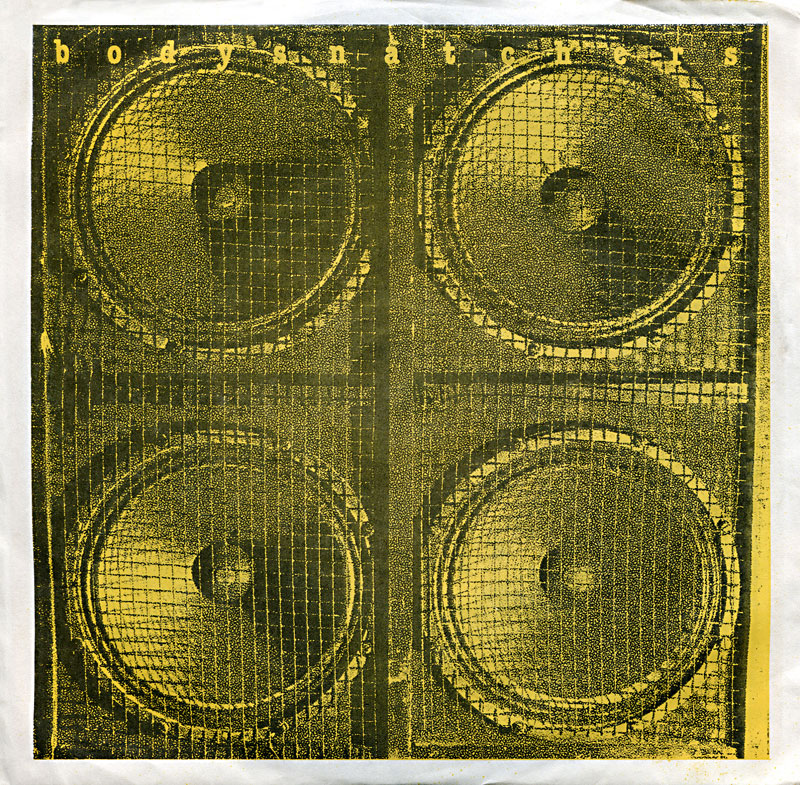
The Wall-O-Sound Records release's Xeroxed sleeve featured a close-up of McMahon's 4x12 guitar speaker cabinet à la the Clash's "Complete Control" cover the previous year. The credits proclaimed the entire thing was recorded "between the hours of ten pm and two am." Bodysnatchers, the EP, detonated five sticks of the sorta sub-Dead Boys dynamite with which they'd been shaking Raul's proprietor Roy Gomez's rafters the past six months.
But James' Johnny Rotten sneer sounds parodic enough to suggest his involvement was possibly a pose. The band went their separate ways not long after its release.
Inferring the project was a lark for a few Bodysnatchers, Brock returned to his more lucrative, enduring gig with Eric Johnson. McMahon scrubbed guitar for a number of later punk or New Wave ensembles, most notably the Other Guys – the first band fronted by Terri Laird, later known as international garage punk all-star Texas Terri Bomb! James himself indulged his love of funk with Daddy Longlegs, who later played a Punk vs. Funk show at Raul's with the Longlegs lineup playing a Bodysnatchers set for the bill's punk half.
Listening to such Bodysnatchers tracks as "Are You Into Destruction" and "Obsession/Depression," it's undeniable that Podolnick's spontaneous recording methodology captured their raw Seventies rock & roll perfectly. The loud/clear/crunchy production rivals the Ramones' Rocket to Russia, the Sex Pistols' debut album Never Mind the Bollocks, or any other well-recorded first-wave punk hallmark released the previous year, 1977. Over time, as future generations explored the nooks and crannies of blank generation esoterica, it's been celebrated as a key example of the retroactive term "KBD punk," named for the semilegal Killed by Death compilations of rare punk singles.
Whereas Erickson's "Two Headed Dog" was Austin's First Punk Single, preceding our scene by two years, Bodysnatchers officially marks the Austin Punk Scene's First Record. And it's a good one.
"Prove You Are Not Boring!"
The Oxford English Dictionary defines fanzines as amateur magazines "for fans of a particular performer, group, or form of entertainment." Some histories place their birth in the 19th century. Summer 1978 brought Austin's first punkzine: Austin Vanguard, brainchild of Nick West, whose nom de punk was either Nick Modern or Nick Fury.
"Published in Texas by Texans" for 15 cents, the Vanguard's sole issue's cover announced in a full-page headline, "SOMEDAY ALL THE ADULTS WILL DIE!" West's hyperventilating prose analyzed recent releases from Brits the Clash and Tom Robinson Band, Los Angeles' the Dils, and our own Roky Erickson. "To Be a Punk in Austin," an editorial/call to arms typical of the spearheading-a-new-generation manifestos opening such zines as Los Angeles' Slash and San Francisco's Search & Destroy, fleshed out the debut.
"Prove you are not boring," West challenged. "That's right. Prove it. Do something exciting. Don't just talk about it. Don't just look for it. Don't just stuff it up your nose and have a 30-minute buzz on it. Do it and do it now. Be a happy individual again."
In conclusion, he urged: "Visit Raul's, a small club on Guadalupe. Be immediately in the midst of an array of the finest specimens of humanity; the most exquisite and expressive rock & roll performances in Austin."
West also marveled at something happening with increasing frequency as the scene grew exponentially: a Municipal Auditorium show featuring internationally noted New Wave luminaries, this time Elvis Costello and the Attractions on May 23. The headliners' producer Nick Lowe opened fronting Rockpile, a crackerjack team of pub rock veterans he co-led with guitarist Dave Edmunds.
"I'm surrounded by leaping crazies," West raved. "AUSTIN IS UN-MELLOWING OUT."
Earlier in the year, the Skunks opened an Armadillo World Headquarters gig headlined by New York's Dictators. A hard rock-meets-Stooges outfit with ties to Blue Oyster Cult, frontman Handsome Dick Manitoba flexed the flamboyant charm of a wrestling heel. As the weather warmed, the floodgates opened, with ex-Velvet Underground main men Lou Reed and John Cale (visiting separately), UK proto-punk heroes Ian Dury & the Blockheads, and Lower East Side trash-popsters-on-the-ascendant Blondie taking local stages.
The night before that Elvis Costello gig, Sublett recalls the headliner and his manager Jake Riviera walking into Raul's as the Skunks tore into their weekly residency.
Two years earlier, Costello was Declan MacManus, a computer operator in West London moonlighting with country-ish pub outfit Flip City. Now signed to Riviera's pioneering indie Stiff Records in the UK and Columbia Records in the U.S., and taking the King of Rock & Roll's name in vain, Costello resembled a pissed-off Buddy Holly, hacking away at extraordinarily bitter, literate originals like "Watching the Detectives" and "Radio, Radio." It struck many ears as a more articulate/musical version of punk.
Now he stood before Austin's Second Punk Band, in Austin's Premier Punk Club.
Sublett prodded Costello to join the Skunks onstage and play "Mystery Dance." The visiting star conceded before surprising Sublett, Blackmon, and Muñoz by remaining onstage, looking over their covers-heavy set list, then grunting, "Just keep going." The quartet ripped through John Lennon's "Cold Turkey," the Velvets' "I'm Waiting for the Man," and the Damned's "Neat Neat Neat."
As the opening chords of Costello tourmate Lowe's 1976 Stiff Records single "Heart of the City" rang out, Lowe himself entered Raul's, with Edmunds and Rockpile drummer Terry Williams in tow. "Nick looked up at the stage, saw Elvis and cracked up laughing," Sublett later wrote in his 2004 memoir, Never the Same Again.
Following a break, Costello returned to the stage with the Skunks, leading them through one country classic after another, foreshadowing his 1981 Nashville-recorded C&W covers album Almost Blue. Upon exiting, he'd completed his first-ever guest appearance with a local American band. The impromptu visit rapidly became a Texas-wide music news item.
Blackmon's recollection differs. He remembers Costello and Riviera being present at soundcheck that afternoon, possibly owing to the latter's friendship with Sublett's girlfriend Lois Richwine. In the Skunks drummer's telling, Riviera intimidated whoever was doing sound into not recording the not-so-spontaneous guest slot. Further, Attractions drummer Pete Thomas nearly destroyed Blackmon's own antique Gretsch kit just by playing it, and Attractions keyboardist Steve Nieve scrapped with some bruiser in the parking lot.
Undisputedly, few witnessed Costello's cameo. Observers increased as further punk/New Wave leading lights made jamming with the Skunks at Raul's part of their tour itineraries. Sublett's memoir reveals he personally engineered many of those onstage meetings, like the night before Blondie made their Austin debut promoting breakout LP Parallel Lines.
He spotted guitarist Chris Stein and singer Debbie Harry outside Mother Earth and approached with his pet skunk, Flowers. As they fawned over the animal, Sublett handed them a flier for his band's Raul's slot later that night, quipping, "By the way, I'm a Skunk." The entirety of Blondie eventually crowded into Raul's, with guitarist Frank Infante, keyboardist Jimmy Destri, and drummer Clem Burke mounting the platform to run through some numbers with the Skunks.
But earlier in the summer, punk's foundational poet laureate herself, Patti Smith, anointed Raul's, backed by the Skunks.
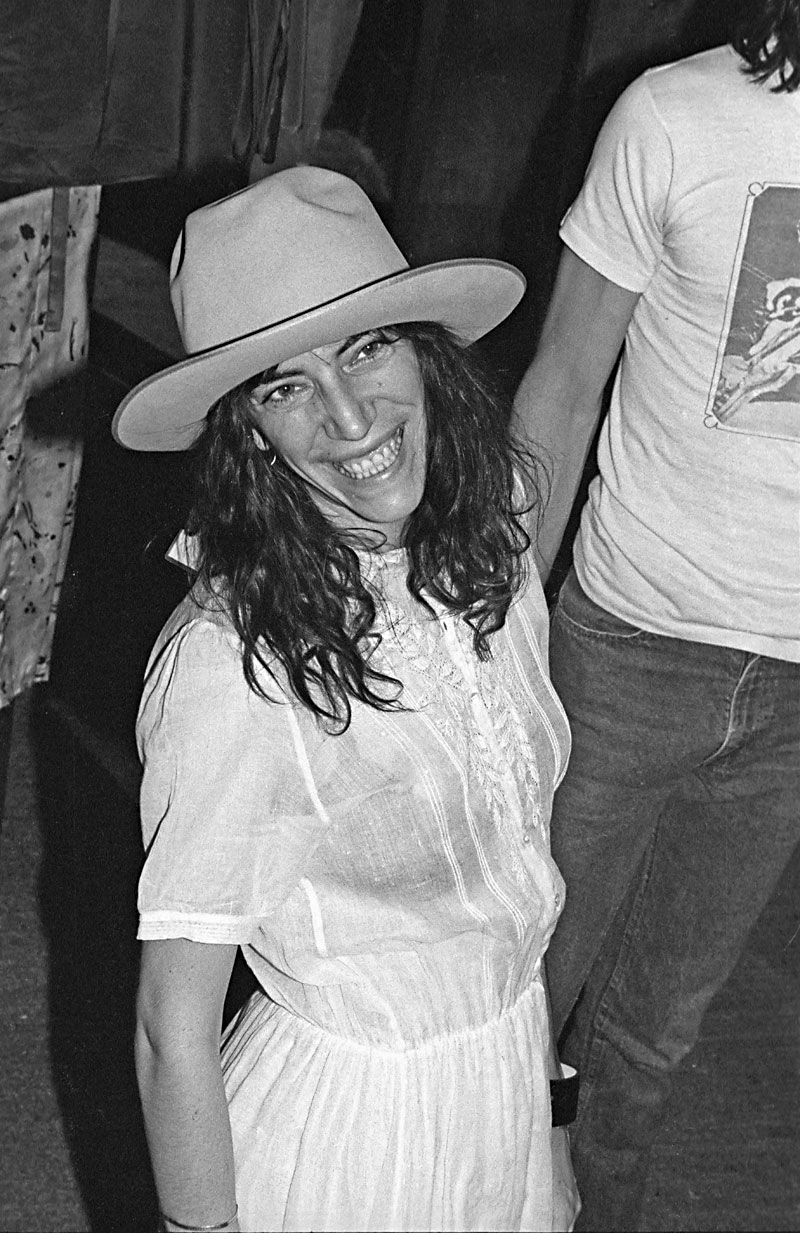
Patti Smith: "We Created It, Let's Take It Over!"
Smith, born in Chicago on Dec. 30, 1946, and raised in a New Jersey suburb, relocated to Manhattan in 1967 to lead a bohemian life. From 1971 onward, she read her wildly oscillating free verse over pioneering rock journalist Lenny Kaye's protean guitar work at various poetry events. The duo evolved into a full-blown rock & roll outfit as fellow poets/musicians Richard Hell and Tom Verlaine built the stage at biker bar CBGB for their own raw Seventies rock & roll outfit, Television.
The music the Patti Smith Group fashioned from their leader's scabrous lyrics ("Jesus died for somebody's sins but not mine") was one part 1965 electric Dylan, one part Sixties garage sounds Kaye codified on his influential 1972 compilation Nuggets, and one part 19th-century transgressive French poet Arthur Rimbaud. Onstage, resembling narcotics-drenched 1972 Keith Richards, Smith acted the rockin' shaman. As the group became the first CBGB act to net a record contract, their three Arista-released LPs from 1975 onward distilled all these disparate threads into a scrappy whole.
Half by being there, half by her own aesthetic decisions, Smith became punk's intellectual conscience and godmother. Coming to Austin during June 1978's final week, she verged upon bona fide rock stardom atop Bruce Springsteen co-written hit "Because the Night," from her new LP, Easter. As she announced on a B-side live demolition of the Who's "My Generation," "We created it, let's take it over!"
On Thursday, June 29, 1978, Smith advanced her gig the following evening at the Austin Opry House with an on-air poetry reading for local radio. Sublett approached with a poster for the Skunks gig at Raul's that night. Smith told the bassist she had a poem called "Skunk Dog," which he affirmed alongside his admiration: "It would be cool if you came down and jammed with us tonight."
"I'll be there," she smiled. "But I can only play in the key of E, okay?"
Word spread. "The place was packed like sardines," says Blackmon, "and it was really, really hot. There was no room to move, and people were crowded up onto the stage."
Smith made her grand entrance toward the set's end, "dressed black on black, with a black bowler pulled so low you couldn't see her face unless she looked straight at you," as Sublett described in his memoir. Strapping on Richwine's Fender Musicmaster, Smith shrugged off the audience's shouted requests and endearments as Muñoz "started making some general racket in the key of E minor." Blackmon's memory recalls said racket becoming a lengthy turn through Smith's blasphemous rewrite of Van Morrison's "Gloria."
As the faithful howled and prostrated themselves before her, the poet randomly hacked noise shards from the guitar, improvising a lyric whose only decipherable language was, "Have no fear/ Tell God the Skunks are here." Fifteen minutes later, the service ground to a halt in a hail of feedback, Smith skulking off after ritualistically sacrificing all six of the Fender's strings.
"She was very dynamic and dramatic," says Blackmon. "She really knew how to work a crowd."
Smith joined the punters on the floor for the rest of the Skunks' set, then climbed back onstage for the choruses of a climactic "My Generation." She was aloof when anyone approached her, her brother/bodyguard Todd Smith eventually extracting her.
"I remember she didn't like my drumming," grouses Blackmon.
For her part, interviewed 44 years later, Smith has few memories of Austin, save for her brother purchasing the antique wedding dress she wore on her Wave album cover the following year.
"Sounds like me," she laughs of 6/29/78. "I don't remember that, only because in that period of time, I did that all over the world. I went onstage with punk rock bands in Brussels or in Amsterdam, Denmark – wherever I might have been. It's just part of what I did. I've been onstage with reggae bands in London. It's part of what's beautiful about rock & roll, taking a little risk, a little communal risk.
"I remember the energy there, though I don't remember that particular incident. I remember standing on a table reading poetry, because there were so many people there.
"I don't perform for myself. I perform so that we have a night that is somewhat transformative, and I hope that people leave more inspired, thinking about what they can do in the world, how they can make things better, how they can make life all around them better.
"People often ask me, 'What is punk rock to you? What is it about?' And I always tell 'em, 'It can be distilled down to one word, and that's freedom.' That's what we were trying to do. We were all young, whether it was kids from Television or the Dead Boys or the Clash. We wanted freedom. Though I revered the artists in the Sixties and the early Seventies, we wanted to do our own thing. A lot of it was based on poetry, sort of a new revolution. But it was all based on freedom. That's what the opening lines to 'Gloria' were about. It wasn't a statement against Jesus. It was saying, 'I wanna be free. I wanna do my own work, make my own decisions about things.'"
So did the Skunks, and any number of other people at Raul's, be they onstage or on the floor.





